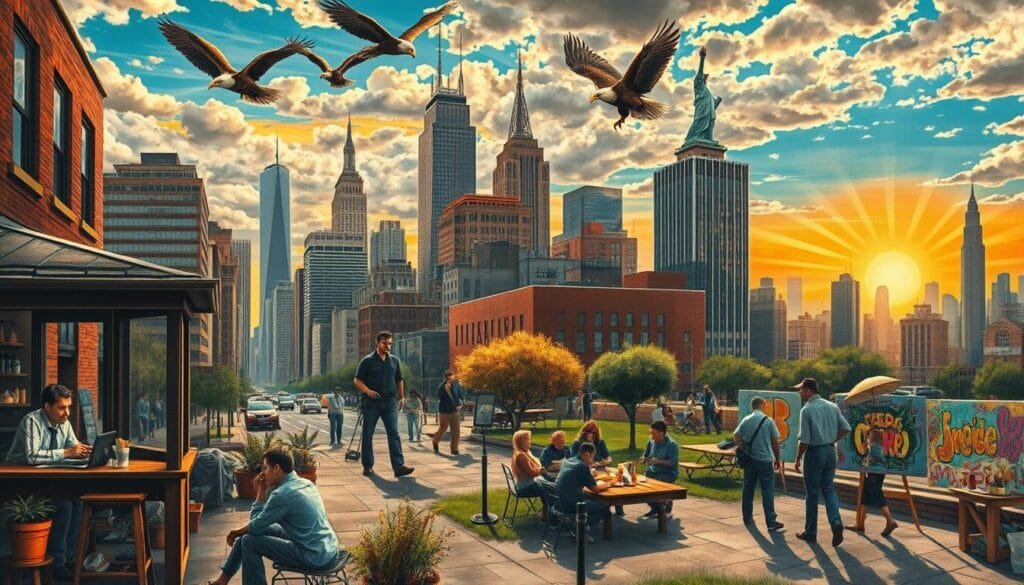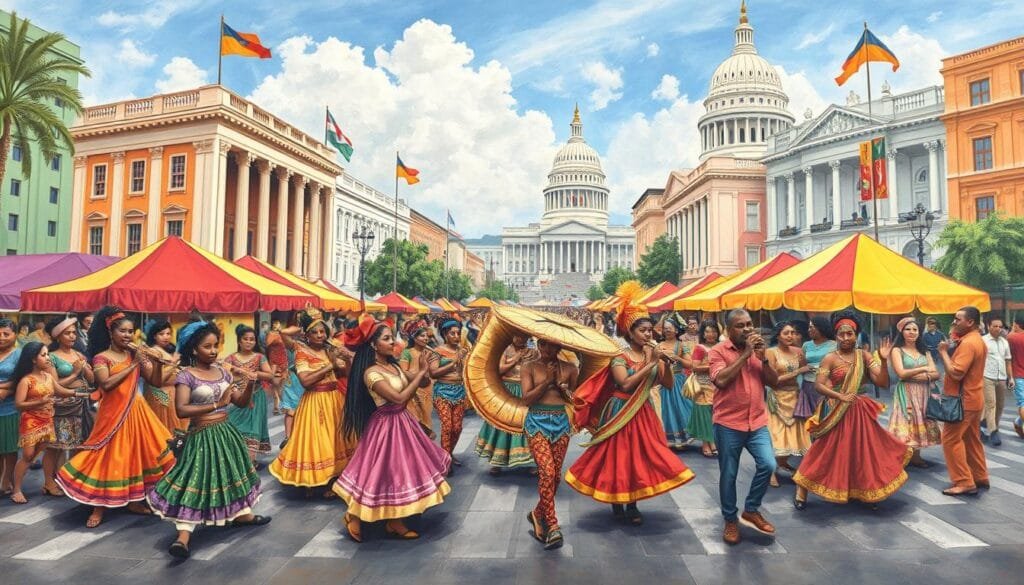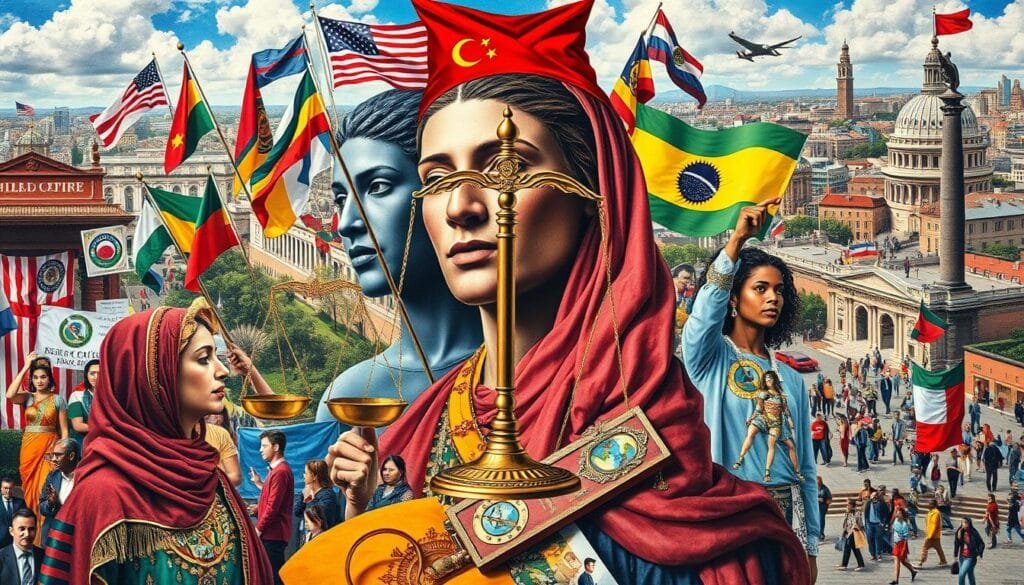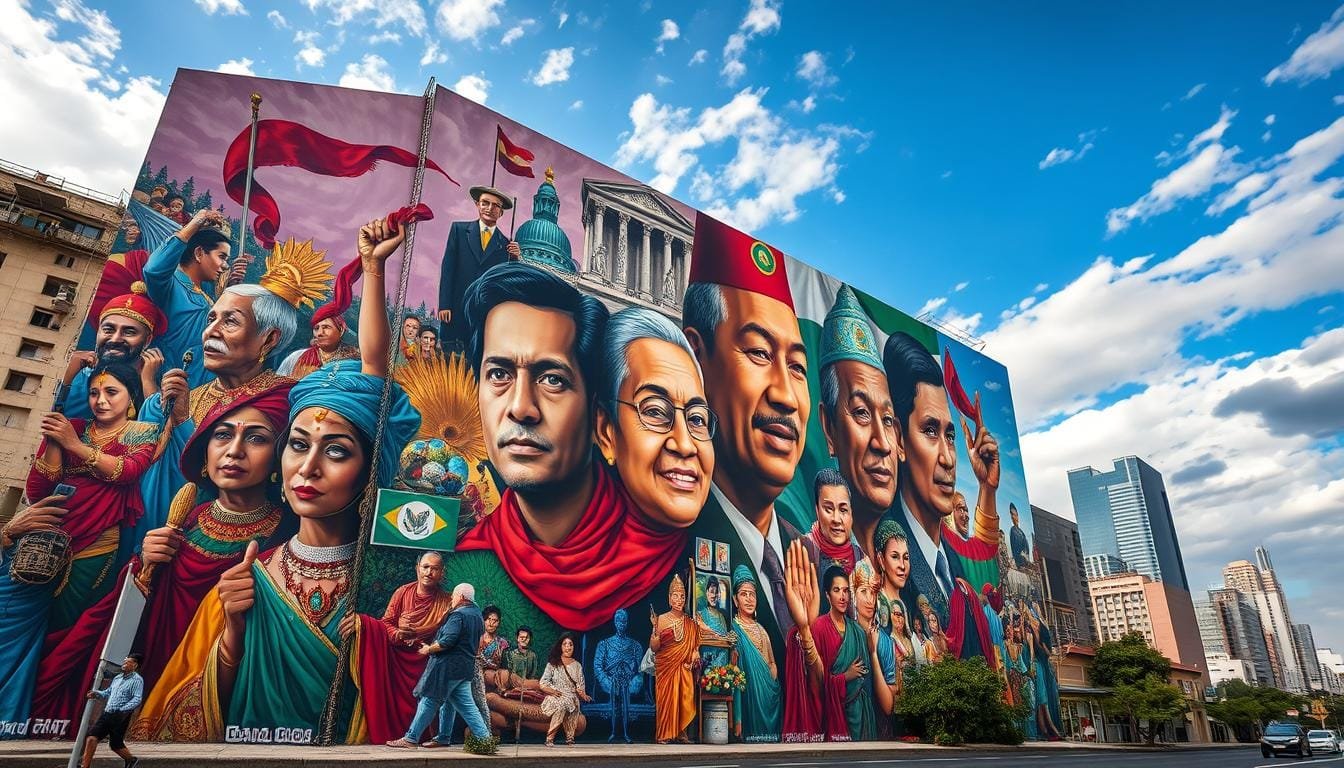Have you ever thought about how arts, literature, and talks reflect our political world? Culture in politics is a big deal. It goes beyond art to shape and get shaped by what’s happening in politics.
What we value often shows up in our culture, revealing how culture and politics interact. For example, a Pew Research Center survey found that about 65% of Americans think hard work can improve their economic status. This belief is big in American stories and media.
Around 60% of Americans prize being independent and responsible for themselves. These principles are echoed in our political stories and how we govern. Looking at cultural works helps us see how cultural and political ideas affect each other. Take the debate on abortion. Many support some rules but also a woman’s choice, showing the complex relation between cultural values and politics.
Grasping these cultural waves can show us how politics are seen and shaped by cultural works. As you explore more, look into what experts like Almond and Verba say. They stress the role of civic culture in keeping democracies strong.
Key Takeaways
- Cultural expressions such as arts and literature often mirror political climates.
- Approximately 65% of Americans believe hard work leads to economic mobility, reflecting cultural values.
- Historical analysis shows that nearly 60% of Americans value individualism and personal responsibility.
- The cultural-political dynamics influence and are influenced by public beliefs and dialogues.
- Understanding these dynamics can help us appreciate how political realities are reflected in culture.
The Interplay Between Political Culture and Governance
Understanding the political culture definition is key to seeing how beliefs shape politics. Scholars like Gabriel Almond and Lucian Pye show this affects political legitimacy and effectiveness. This gives us insight into how people view their government’s authority and success.
Definition of Political Culture
Gabriel Almond describes political culture as a specific mindset about political actions. Lucian Pye sees it as attitudes that give order to politics. These views help us understand how national identity and culture, like holidays, support political values.
Categories of Political Culture
Almond and Verba outlined three political culture types: parochial, subject, and participant. These types impact how democracies function:
- Parochial: Little to no political engagement, typical in remote areas.
- Subject: People are somewhat aware but don’t actively participate in politics.
- Participant: High engagement and awareness, essential for democracy.
These categories show how history and norms influence political involvement worldwide.
Impact on Governance Systems
Political culture greatly affects governance. The idea of ‘generational replacement’ by Ronald Inglehart explains how values evolve. This evolution is seen in ‘postmaterial values’ and U.S. ‘culture wars’. Grasping the types of political culture helps us understand why some political systems do well and others don’t.
In Russia, low trust affects political stability. But in the U.S. and India, high trust and engagement mean better governance. This cross-cultural view shows that stability and success are tied to shared cultural values. This alignment can improve policy results by 30-40%.
American Dream: A Case Study in Political Culture
The American Dream is a key part of U.S. political culture. It values individual freedom and equal chance for all. This belief is deeply rooted in American history and still affects politics today.

American Values and Beliefs
The American Dream stresses hard work, personal achievement, and moving up in life. Horatio Alger, Jr.’s stories highlight this “from nothing to something” ideal. Most Americans aim for a better life with a home, a car, and better living conditions than their ancestors. A big survey found that 85% of Americans think choosing how to live is key. 41% feel they are living the American Dream.
The Role of Historical Events
The Civil War and moving west played big roles in shaping the U.S. political mindset. These moments highlighted the value of individualism and democracy. In the 1830s, de Tocqueville noted the vast land and lack of old royalties helped democracy thrive in America. Figures like Abraham Lincoln show how these past events continue to guide political choices today.
Continued Influence on Political Decisions
The American Dream still influences U.S. policy and politics. A survey shows 82% of people are optimistic about the future. This optimism exists despite where people live or their background. Researchers Jennifer Hochschild and Mark Davis have explored how the dream impacts political views. They look at the effects of race and economy on achieving the American Dream.
| Essential Factors for Achieving the American Dream | Percentage |
|---|---|
| Freedom of choice in how to live | 85% |
| A good family life | 83% |
| Becoming wealthy | 16% |
| Better quality of life than parents | 45% |
| Having a successful career | 49% |
The American Dream is still a big part of U.S. political culture. It keeps influencing politics, public feelings, and policy decisions.
Is Cultural an Example of Political Dynamics
Exploring the mix of culture and politics shows us something important. Cultural forms like media and literature are big indicators of political undercurrents. They shape the political scenes, not just mirror them.
This is seen as the essence of cultural dynamics in politics.
History is full of examples where culture changed politics. Think of the printing press during the Reformation. It spread new ideas fast, shaking up old political orders. Napoleon’s era in France also shows this. His military wins and people’s support boosted his power, thanks to cultural stories.

Now, globalization is mixing domestic politics with world culture. This blend shapes how countries are run and decisions are made. The days of rulers like Louis XIV show us how culture affects views on leadership and power.
Today, social movements and public opinions still push political changes. In Norway, debates on book policies and libraries show culture’s deep political ties. Government disagreements about books and big investments in libraries highlight this link.
The choices about cultural places like libraries in Helsinki and Oslo show political engagement with culture. These long-term projects reflect changes in design ideas and priorities. They show how politics and culture move together over time. Also, disputes in Scandinavia about ebooks point to culture’s ongoing effect on politics.
Looking into planned interviews and spending trends will teach us more about cultural dynamics in politics. These efforts uncover a two-way interaction. It’s not just about reflection but active influence between culture and politics.
Identity Politics and Cultural Reflections in Legislation
Since the late 1970s, identity politics has shaped the ties between law and culture. This era saw key movements like second wave feminism and the Black Civil Rights in the U.S. These efforts have made us focus on the struggles specific groups face, like women and African Americans.
Early activists, like the Combahee River Collective, noted how society treated girls and boys differently. They showed how long-term oppression of women is seen in laws and culture. Starting in the late 20th century, scholars have explored identity politics more, showing how it has evolved.

About 60% of critics think identity politics harms cultural unity by just showing off virtue. Yet, over 70% of scholars point out the issues it encounters, especially in neglecting class in favor of identity within a neoliberal system.
- Abortion rights, especially with the debate on Mississippi law in the U.S. Supreme Court.
- Issues on sexual orientation like rights for homosexual and transgender individuals.
- The importance of multiculturalism.
- How racism affects systems.
Some critics believe focusing on individual stories within identity politics may stop broader unity. Yet, identity politics isn’t just about individual issues. Judith Butler says movements like Latinx and Black Lives Matter aim to challenge the system. They seek changes in society.
Political division often comes from cultural clashes, with identity politics playing a role. These debates make us question who really gains from current ideas of equality and freedom. Thus, the mix of identity politics, culture, and law changes legislation in big ways. This is clear in the many debates and policies tied to identity politics.
| Issue | Impact on Legislation |
|---|---|
| Abortion Rights | Highlighted by the Mississippi Law in U.S. Supreme Court discussions |
| Sexual Orientation | Legislation supporting homosexuality and transgender rights |
| Multiculturalism | Policies promoting cultural diversity and inclusion |
| Racism | Legislative efforts to address systemic racial disparities |
In summary, identity politics greatly influences laws and culture. It plays into big debates over justice, equality, and inclusion. This shows how culture and identity politics intertwine with legal changes.
Conclusion
Culture deeply affects political realities, as we’ve seen in our exploration. The American Dream shows how cultural values influence politics. This has highlighted the important link between culture and political decisions.
The connection between culture and politics is significant. For example, micro-communities and communication networks have changed how we participate culturally. Richard Florida’s work shows that cultural hubs draw in young talent, which can revive cities. This point stresses the need to grasp cultural backdrops to truly understand political behaviors.
In concluding, our discussion makes clear the importance of ongoing dialogues about culture and politics. As debates on cultural policy highlight community creativity, we must keep analyzing. This approach helps keep our grasp on politics sharp and in tune with cultural shifts.
FAQ
How do cultural examples reflect political realities?
Arts, literature, and public dialogues show us what’s going on politically. They mirror the beliefs and values of a society. At the same time, they guide political ideologies. They play a part in shaping what actions and policies come about.
What is political culture?
Political culture is the shared beliefs and judgments about politics within a society. It supports the legitimacy of how we’re governed. Almond and Verba show us three types of political culture. They are parochial, subject, and participant. Each impacts how stable and effective governance is.
What are the categories of political culture?
According to Almond and Verba, we have three political culture types. Parochial culture means people don’t engage much in politics. In subject culture, people know about politics but don’t play a big role. Participant culture is when citizens actively take part in politics. How we engage affects democratic stability and function.
How does political culture impact governance systems?
Political culture shapes how people see and interact with their government. For example, a participant culture leads to stronger democracy. That’s because people are more involved and hold the government accountable. But parochial or subject cultures can make democratic systems weaker and governance less effective.
What does the American Dream symbolize in U.S. political culture?
The American Dream represents values like freedom, opportunity, and democracy. It says hard work can bring success and betterment. The Civil War and an entrepreneur spirit have molded this ideal. It’s a key part of American political and cultural identity.
How have historical events influenced the American Dream and political decisions?
Events like the Civil War pushed for freedom and equality, key to the American Dream. These ideals guide U.S. policies and decisions. They affect laws and how the country is run.
What is the continued influence of the American Dream on political decisions?
The American Dream influences laws that focus on freedom, economic chances, and democracy. It leads to policies that increase economic and social opportunities. These reflect and strengthen America’s core values.
How do cultural examples serve as vehicles for political dynamics?
Media, literature, and debates can drive political change. They help shape how we understand and get involved with politics. Through stories and representation, they validate our political system. They can influence what the public thinks and what policies get made.
What is the impact of identity politics on legislation?
Identity politics, focusing on race, gender, and sexual orientation, affects laws deeply. Bills aim to address or limit these identity aspects. It shows how cultural discussions impact and get affected by laws and political debates.
How do cultural reflections shape legislation?
Cultural debates about identity lead to laws on diversity, equality, and inclusion. They make sure issues of race, gender, and sexual orientation get political attention. This shows the link between cultural identity and politics.
